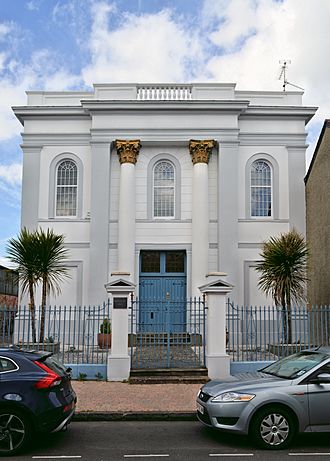Glendower House, Monmouth facts for kids
Quick facts for kids Glendower House |
|
|---|---|

Glendower House
|
|
| Former names | Monmouth Congregational Chapel |
| General information | |
| Type |
|
| Architectural style | Georgian |
| Location | Monmouth, Wales |
| Coordinates | 51°48′41″N 2°42′51″W / 51.8113°N 2.7142°W |
| Construction started | 1843 |
| Completed | 1844 |
| Design and construction | |
| Architect | William Armstrong |
| Designations | Grade II* listed building |
Glendower House, also known as Glyndŵr House, is a special building located on Glendower Street in Monmouth, Wales. It was built during the Victorian era and used to be a church for a group called Congregationalists. The building has a beautiful Classical style.
Experts from the Royal Commission on the Ancient and Historical Monuments of Wales have called it "a chapel of exceptional sophistication." They also noted it was one of the first Italian-style chapels in Wales. The house is named after Owain Glyndŵr, a famous Welsh leader from history.
Contents
The Story of Glendower House
Early Days of the Chapel
Before Glendower House was built, the Congregationalists in Monmouth met in different places. They first worshipped at Dixton Gate. Later, they moved to Dyffryn House on St Mary Street. Finally, they settled on Glendower Street.
This group of worshippers was quite successful and important in the town. Many of its members were involved in local events, like the eisteddfod, which are Welsh festivals of literature, music, and performance.
Building a New Home
The current building was constructed between 1843 and 1844. It was designed by an architect named William Armstrong from Bristol. The front of the building has a grand, impressive look. It features large Corinthian columns, which are a type of fancy pillar.
Glendower House is actually a smaller version of another building Armstrong designed. That building is the Brunswick Chapel in Bristol. Glendower House also has beautiful stained glass windows. These windows were made by the Camm Brothers from Smethwick.
From Chapel to Home
On October 27, 1965, Glendower House was given a special status. It was listed as a Grade II* building. This means it is a very important historical building.
For a while, the building was almost falling apart. But in 2002, it was saved and turned into a private home. The owner, Anthony Sully, received a large grant from Cadw. Cadw is the Welsh government's historic environment service. Mr. Sully designed the conversion himself.
The project was so impressive that it was shown on three TV shows in the UK. It also won an award from the Civic Trust for Wales in 2003–2004. Today, Glendower House stands as a beautiful example of how old buildings can be given new life.

